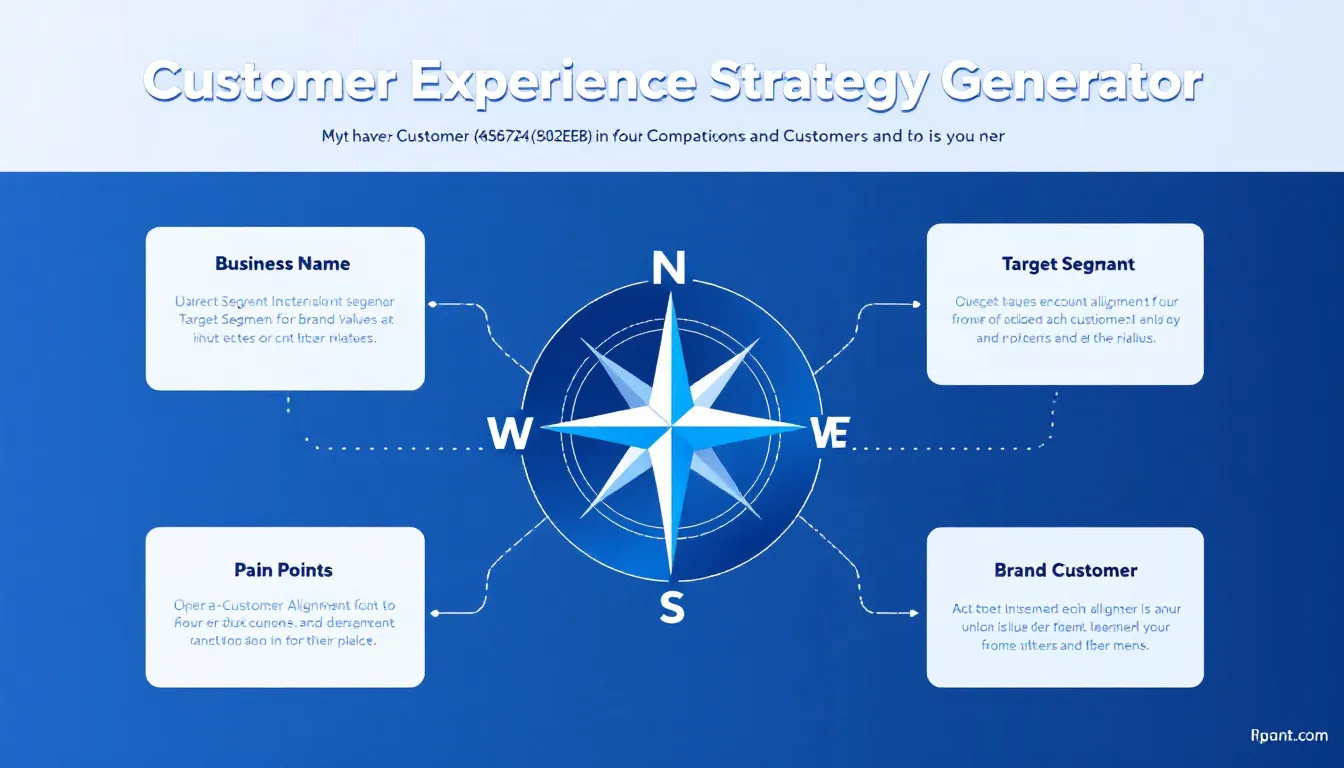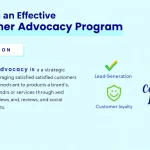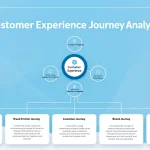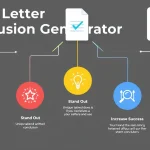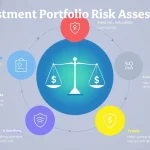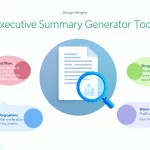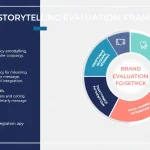Is this tool helpful?
How to Use the Customer Experience Strategy Generator Effectively
1. Business Name
Enter the full name of your business to personalize the strategy. Examples include:
- Harmony Wellness Center
- BrightPath Marketing Agency
2. Target Customer Segment
Clearly define the demographics and traits of the customers you want to delight. For example:
- Mid-career creative freelancers aged 28-40 in metropolitan areas
- Parents with young children seeking educational toys
3. Core Brand Values
List the fundamental principles that your brand stands by. Examples include:
- Transparency, Innovation, Customer Empowerment
- Quality, Community Engagement, Sustainability
4. Customer Pain Points
Explain the main challenges your customers face when interacting with your business. For instance:
- Slow response times, unclear product information, lack of post-purchase support
- Difficulty navigating website, limited payment options, inconsistent customer service
Understanding the Customer Experience Strategy Generator
The Customer Experience Strategy Generator creates tailored strategies that enhance your brand’s interactions with customers. It uses your input about your business, audience, brand values, and pain points to deliver actionable plans aimed at improving customer satisfaction and loyalty.
Purpose and Benefits
- Personalized strategies: Receive recommendations specific to your business context.
- Save time: Cut down strategy development from weeks to minutes.
- Data-driven insights: Base plans on proven customer experience principles combined with your unique inputs.
- Scalable approaches: Implement strategies that grow with your business.
Key Features of the Tool
- Brand and customer alignment: Ensure your strategies reflect your core values and appeal to your audience.
- Touchpoint optimization: Identify and improve customer interactions across channels.
- Pain point solutions: Address customer challenges directly and effectively.
- Experience enhancement: Suggest specific actions for lasting engagement.
Practical Usage of the Customer Experience Strategy Generator
Use the generator by filling out each field with accurate information to receive a detailed customer experience plan. The tool processes your entries and returns a strategy that you can implement immediately or adapt as needed.
Step-by-Step Workflow
- Provide clear business and customer details: The more precise your input, the better the strategy fits your needs.
- Submit the form: The tool quickly analyzes your data and generates a comprehensive strategy.
- Review the results: Use the breakdown to pinpoint key improvements and align your team.
- Implement the recommendations: Apply suggested actions and track performance to refine your approach.
Example Use Cases
- A local cafe: Identifies peak hours with long wait times and plans streamlined service touchpoints.
- An online education platform: Aligns brand values of accessibility and innovation with improved onboarding experiences.
- A software provider: Creates detailed support workflows to reduce common customer frustrations.
Benefits of Using This Customer Experience Strategy Generator
1. Accelerated Strategy Development
You save valuable time by generating focused strategies within minutes instead of weeks. This speed lets you respond quickly to evolving customer expectations.
2. Actionable, Data-Backed Recommendations
The generator combines your inputs with proven customer experience frameworks to deliver practical and measurable guidance.
3. Tailored and Scalable Strategies
Strategies are customized to your specific business needs while allowing for future growth and new customer segments.
Solving Common Customer Experience Challenges
Optimizing Customer Journeys
- Pinpoint critical customer touchpoints that impact satisfaction.
- Develop consistent experiences across channels.
- Propose targeted improvements for smoother journeys.
Embedding Brand Values into Experiences
- Align all customer interactions with your core brand promises.
- Create genuine connections that foster loyalty.
- Reinforce your brand identity consistently.
Practical Examples and Results
Example 1: Hospitality Upgrade
Business Name: GreenLeaf Eco Lodge
Target Segment: Eco-conscious travelers seeking sustainable accommodation
Brand Values: Sustainability, Comfort, Authenticity
Customer Pain Points: Limited eco-friendly options, slow check-in, unclear local information
Outcomes:
- 25% boost in repeat guest bookings
- Improved online reviews citing smooth check-in process
- Increased satisfaction with environmental initiatives
Example 2: Financial Services Enhancement
Business Name: SecureFunds Advisors
Target Segment: Young professionals seeking trustworthy investment guidance
Brand Values: Transparency, Expertise, Trust
Customer Pain Points: Complex jargon, limited personalized advice, delayed responses
Outcomes:
- 40% reduction in customer support tickets
- Higher client retention rates
- Positive feedback on personalized financial plans
Frequently Asked Questions About the Customer Experience Strategy Generator
How quickly can I generate a strategy?
You receive a comprehensive customer experience strategy within minutes of submitting your information.
Can I customize the strategy after it’s generated?
Yes, the generated strategies offer frameworks you can adapt to fit evolving business goals and customer needs.
Is this tool suitable for my industry?
The generator works across various sectors, including retail, hospitality, professional services, and more.
How often should I update my customer experience strategy?
Review and update your strategy quarterly or whenever significant market or organizational changes occur.
Can I use the tool to create strategies for multiple customer segments?
Absolutely. You can generate distinct strategies tailored to different customer groups to optimize each experience effectively.
Best Practices for Implementing Your Customer Experience Strategy
1. Preparation Phase
- Collect detailed customer feedback through surveys and interviews.
- Audit all existing customer touchpoints to identify areas for improvement.
- Analyze current performance metrics to understand baseline experience.
2. Implementation Phase
- Prioritize quick-win actions to build momentum and demonstrate value.
- Train employees thoroughly on new customer service protocols.
- Monitor early feedback and adjust processes as needed.
3. Optimization Phase
- Gather ongoing input from customers and frontline staff.
- Refine the strategy regularly based on real-world results.
- Scale successful initiatives across broader segments or channels.
Important Disclaimer
The calculations, results, and content provided by our tools are not guaranteed to be accurate, complete, or reliable. Users are responsible for verifying and interpreting the results. Our content and tools may contain errors, biases, or inconsistencies. Do not enter personal data, sensitive information, or personally identifiable information in our web forms or tools. Such data entry violates our terms of service and may result in unauthorized disclosure to third parties. We reserve the right to save inputs and outputs from our tools for the purposes of error debugging, bias identification, and performance improvement. External companies providing AI models used in our tools may also save and process data in accordance with their own policies. By using our tools, you consent to this data collection and processing. We reserve the right to limit the usage of our tools based on current usability factors.
